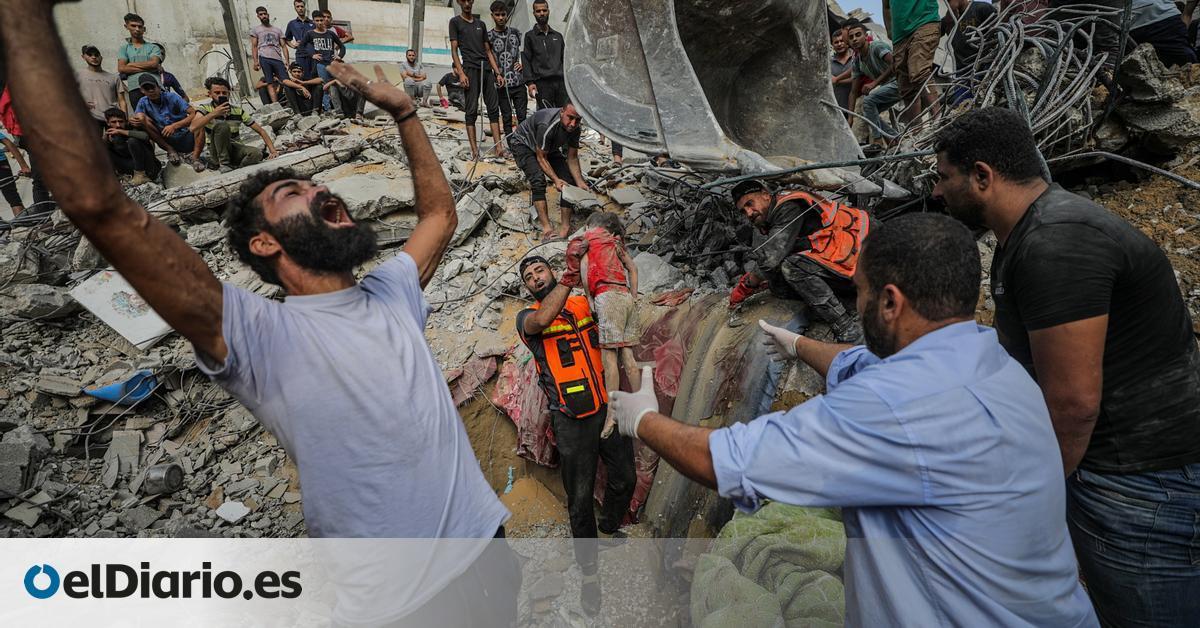
The uncontrolled shaking of the hands shakes the sheet with the ambassador’s written speech. The broken voice contains the tears of the Palestinian representative, Riyad Mansour, at the lectern of the UN General Assembly. “Vote to end three weeks of the worst double standards we’ve seen in decades and restore some credibility to this place.” Immediately afterwards, the Israeli ambassador, Gilad Erdan, takes the stage and starts his speech: “This emergency session has nothing to do with peace.”
The scene occurred this Thursday while the General Assembly was debating a resolution to stop the conflict. Although its decisions are not binding, in the Security Council four different resolution proposals have failed to move forward mainly due to the veto of the great powers. On Friday the General Assembly did approve a resolution calling for a “humanitarian truce” by 120 votes in favor, 14 against and 45 abstentions in the first UN response to hostilities since the Hamas attack on October 7. The US and Israel voted against. Of the EU, only Austria, Croatia, the Czech Republic and Hungary rejected the resolution
The #HER Tenth Emergency Special Session just adopted Resolution ES-10/21. pic.twitter.com/R7DTNyaAOM
—UN GA President (@UN_PGA) October 27, 2023
After decades ignoring dozens of resolutions, both from the General Assembly and the Security Council, Israel has redoubled its challenge to an organization that, once again, is blocked in the face of the crisis in Gaza. The same year as Israel’s declaration of independence, based on a non-binding General Assembly resolution recommending a two-state partition plan, the General Assembly called on Israel to allow the return of Palestinian refugees who wished to do so and compensation. to those who did not. That, however, was never fulfilled.
Now, Israel has called for the resignation of the UN Secretary General, António Guterres, and has assured that it will cancel visas for the organization’s workers. What sparked the anger of the Israelis was that although Guterres declared that nothing justifies the massacre of civilians committed by Hamas, he recalled that this occurs after 56 years of “suffocating occupation.”
“If Israel refuses to cooperate with the UN on humanitarian issues, that will make it difficult for workers to help the population in Gaza, but it seems quite clear that the US and Europe want the UN to continue delivering aid in Gaza,” he told elDiario.es. Richard Gowan, director of the United Nations program at the International Crisis Group think tank. “The US has been very clear in its support for Guterres and I think it will be quite firm with the Israelis that they have to continue working with the UN. “They will have to find a way to back down because otherwise the US will not be very happy with their behavior.”
Jaume Saura, professor of International Law at the University of Barcelona, recalls that Israel’s escalation in its confrontation with the UN “is nothing new.” “It has always had a hostile attitude towards the UN simply because at the UN there is an overwhelming majority of states that condemn its human rights violations,” he says.
“The secretary general’s measured words have been the perfect excuse for an overreaction that makes the work of UN agencies on the ground even more difficult (particularly UNRWA, the UN agency for Palestinian refugees),” says Saura. who, like Gowan, believes that “Israel will eventually give in to international pressure.”
Israel denounces that the UN is “obsessed” with the Palestinian issue and that many of its agencies, from the Human Rights Council to UNESCO, including UNRWA or the figure of the special rapporteur, have an anti-Israeli bias. The Israeli Foreign Ministry has even accused UNRWA – which has lost 53 workers due to bombings in this offensive – of being “friends of terrorists” and Netanyahu has called for its closure for promoting discourse in favor of the “elimination of Israel.” .
Recently appointed ambassador, Erdan wrote a column in an Israeli newspaper in September 2020 in which he stated that the UN “is risking losing the last vestiges of relevance and legitimacy” that it has left. “If the organization cannot take action against the worst regimes and continues to be obsessed with the Palestinian question, in 75 years there will be no UN to mark its birthday because it will have lost its right to exist.”
This discourse is precisely what has allowed Israel to ignore dozens of resolutions, reports and even opinions of the International Court of Justice for decades, says Claudia Jiménez, professor of International Law at the Barcelona Institute of International Studies. “When they tell you that you have to do something, but that it is a recommendation and on top of that you consider that the body that issues it is anti-Semitic and you question the legitimacy of the decision because you believe that that body does not understand the problem, the logic and the law of Israel to defend themselves, the answer is ‘you don’t know my reality and I don’t pay attention to you,'” says Jiménez.
The shield in the Security Council
“In the case of the UN Security Council resolutions that Israel has not complied with, they are also requests, that is, they are not binding. They have the same value as one from the General Assembly,” says Jiménez. “If they wanted, they could make them binding, but for that they have to be formulated under Chapter VII of the UN Charter. I don’t know of any of this type against Israel,” he adds.
Several resolutions of this body have condemned the illegal settlements built in occupied territory and call on Israel to end this policy. The last resolution of this type was approved in 2016 – Obama ordered the US to abstain when it had already lost the elections – but another similar one was approved in 1979. The Security Council also asked Israel in 1968 to rescind the illegal annexation of Jerusalem. .
In other cases, the most powerful body of the UN has imposed binding sanctions – up to 31 times: including Yemen, Iraq, Iran, Yugoslavia and Libya – to maintain peace. A historic case was the sanctions regime against South Africa of the apartheid. Israel, for its part, has been described by human rights organizations and experts, including the UN special rapporteur for Palestine, as a regime of apartheid.
Gowan believes that in the General Assembly and other bodies there is “strong pro-Palestinian sentiment.” “But in the Security Council, which is the body that matters at the moment, the US uses its veto to defend Israel. In the last outbreak of violence in 2021, the Biden Administration did not even allow the Council to publish a press release showing its concern until Israel achieved its military objectives,” says the expert.
“As Israel is protected in the Security Council by the US veto, they can ignore a lot of that criticism from various UN bodies because they know they have the US shield,” says Gowan. “Still, they are very sensitive to that criticism. “They believe they are unfair and the reaction to Guterres indicates the depth of that feeling.” The researcher maintains that Guterres has historically avoided offending Israel: “he is not an anti-Semitic or anti-Israel politician.”
The use of the veto and the Brazilian proposal
Four failed resolution proposals on the current crisis have been presented in the Council: two of them prepared by Russia (without enough votes), one by the US (vetoed by Russia and China) and one by Brazil (vetoed by the US). “Brazil was the most frustrating,” Gowan says.
“Brazil worked very hard to produce a text that was comfortable for everyone and softened the language a lot. Removed reference to ceasefire [que incomoda a EEUU] and made many concessions to the United States. “The diplomats thought that Washington would abstain and that it was very close to being approved,” he explains. “But then came the hospital incident with subsequent confusion and anger and the US felt it could not abstain on a resolution that was even remotely negative towards Israel. It was a text that Israel was very close to approving.”
“Israel is a power in itself and has powerful allies, starting with the United States. For this reason, it can fail to comply with the resolutions of the General Assembly with impunity and the Security Council has intervened very timidly in the conflict, which, yes, has clearly determined the obligation to abandon the occupied territories, but without taking the slightest sanctioning measure,” Saura says. “Unfortunately, this is not the only case of impunity. The case of Morocco with the Sahara is another example.”
Source: www.eldiario.es

